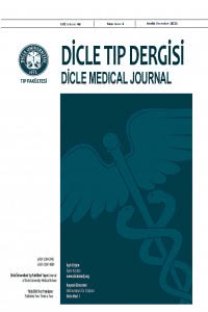Irritable Bowel Syndrome In Multiple Sclerosis Patients and Its Relation To Attacks
Multipl Skleroz Hastalarında İrritabl Barsak Sendromu ve Ataklarla Olan İlişkisi
___
1.Marrie RA, Horwitz R, Cutter G, et al. Comorbiditydelays diagnosis and increases disability atdiagnosis in MS. Neurology 2009; 72: 117–24. doi:10.1212/01.wnl.0000333252.78173.5f.2.Marrie RA, Rudick R, Horwitz R, et al. Vascularcomorbidity is associated with more rapid disabilityprogression in multiple sclerosis. Neurology 2010;74: 1041–7. doi: 10.1212/WNL.0b013e3181d6b125.
3.Köseoglu M, Gözübatik Çelik RG, Tütüncü M, ErbaşB.Quality of Life in Multiple Sclerosis: AreDepressive Findings as Effective as PhysicalDisability? Dicle Med J 2020; 47: 712-9. doi:10.5798/dicletip.800284.
4.Warren SA, Turpin KVL, Pohar SL, Jones CA,Warren KG. Comorbidity and health-related qualityof life in people with multiple sclerosis. Int J MS Care2009; 11: 6–16. doi: 10.7224/1537-2073-11.1.6.
5.Weinstock-Guttman B, Zivadinov R, Horakova D,et al. Lipid profiles are associated with lesionformation over 24 months in interferon-β treatedpatients following the first demyelinating event. JNeurol Neurosurg Psychiatry 2013; 84: 1186–91.doi: 10.1136/jnnp-2012-304740.
6. Fromont A, Binquet C, Rollot F, et al. Comorbiditiesat multiple sclerosis diagnosis. J Neurol 2013; 260:2629–37. doi: 10.1007/s00415-013-7041-9.
7.Kang JH, Chen YH, Lin HC. Comorbidities amongstpatients with multiple sclerosis: A population-basedcontrolled study. Eur J Neurol 2010; 17: 1215–9. doi:10.1111/j.1468-1331.2010.02971.x.
8.Guan XL, Wang H, Huang HS, Meng L. Prevalenceof dysphagia in multiple sclerosis: a systematicreview and meta-analysis. Neurol Sci 2015 May; 36:671-81. doi: 10.1007/s10072-015-2067-7.
9.Nusrat S, Gulick E, Levinthal D, Bielefeldt K.Anorectal dysfunction in multiple sclerosis: asystematic review. ISRN Neurol 2012; 2012:376023. doi: 10.5402/2012/376023.
10.Mayer EA, Savidge T, Shulman RJ. Brain-gutmicrobiome interactions and functional boweldisorders. Gastroenterology 2014; 146: 1500-12.doi: 10.1053/j.gastro.2014.02.037.
11.Marrie RA, Reider N, Stuve O, et al. The incidenceand prevalence of comorbid gastrointestinal,musculoskeletal, ocular, pulmonary, and renaldisorders in multiple sclerosis: a systematic review.Mult Scler 2015; 21: 332-41. doi:10.1177/1352458514564488.
12.Mearin F, Lacy BE, Chang L, et al. BowelDisorders. Gastroenterology 2016; 18: S0016-5085(16)00222-5. doi:10.1053/j.gastro.2016.02.031.
13. Özgürsoy Uran BN, Vardar R, Karadakovan A, BorS. The Turkish version of the Rome III criteria for IBSis valid and reliable. Turk J Gastroenterol 2014; 25:386-92. doi: 10.5152/tjg.2014.4774.
14.Polman CH, Reingold SC, Banwell B, et al.Diagnostic criteria for multiple sclerosis: 2010revisions to the McDonald criteria. Ann Neurol2011; 69. 2: 292-302. doi: 10.1002/ana.22366.
15.Kurtzke JF. Rating neurologic impairment inmultiple sclerosis an expanded disability statusscale (EDSS). Neurology 1983; 33: 1444-52. doi:10.1212/wnl.33.11.1444.
16.Karaman N, Türkay C, Yönem O. Irritable bowelsyndrome prevalence in city center of Sivas. Turk JGastroenterol 2003; 14: 128-31.
17.Celebi S, Acik Y, Deveci SE, et al. Epidemiologicalfeatures of irritable bowel syndrome in a Turkishurban society. J Gastroenterol Hepatol 2004; 19:738-43. doi: 10.1111/j.1440-1746.2004.03367.x.
18.Bytzer P, Talley NJ, Leemon M, et al. Prevalenceof gastrointestinal symptoms associated withdiabetes mellitus: a population-based survey of 15000 adults. Arch Intern Med 2001; 161: 1989-96.doi: 10.1001/archinte.161.16.1989.
19.Patten GS, Abeywardena MY. Effects ofantihypertensive agents on intestinal contractility inthe spontaneously hypertensive rat: angiotensinreceptor system downregulation by losartan. JPharmacol Exp Ther 2017; 360. 2: 260-6. doi:10.1124/jpet.116.237586.
20.Yakar B, Demir M. Evaluation of Adherence toAntihypertensive Drug Treatment Affecting Factorsin Patients with Chronic Renal Failure. Dicle Med J2019; 46: 685-96. doi: 10.5798/dicletip.661259.
21.Duran GG, Melek IM, Duman T, Gunesacar R.Investigation of the Relationship Between SerumSolubl Fas (sFas), Soluble Fas Ligand (sFasL) Levelsand FAS-FASLG Polymorphisms in Patients withMultiple Sclerosis. Dicle Med J 2020; 47: 331-9.
22.Horton M, Rudick RA, Hara-Cleaver C, Marrie RA.Validation of a Self-report comorbidityquestionnaire for multiple sclerosis.Neuroepidemiology 2010; 35: 83–90. doi:10.1159/000311013.
23.Levinthal DJ, Rahman A, Nusrat S, et al. Adding tothe burden: gastrointestinal symptoms andsyndromes in multiple sclerosis. Mult Scler Int 2013:319201. doi: 10.1155/2013/319201.
24.Marrie R, Horwitz R, Cutter G, et al. Comorbidity,socioeconomic status, and multiple sclerosis. MultScler 2008; 14: 1091–1098. doi:10.1177/1352458508092263.
25.Marrie RA, Yu BN, Leung S, et al.; CIHR Team inthe Epidemiology and Impact of Comomrbidity onMultiple Sclerosis. The utility of administrative datafor surveillance of comorbidity in multiple sclerosis:a validation study. Neuroepidemiology 2013; 40:85–92. doi: 10.1159/000343188.
26.Marrie RA, Horwitz RI, Cutter G, Tyry T, VollmerT.Association between comorbidity and clinicalcharacteristics of MS. Acta Neurol Scand2011;124:135–141. doi: 10.1111/j.1600-0404.2010.01436.x.
- ISSN: 1300-2945
- Yayın Aralığı: 4
- Başlangıç: 1963
- Yayıncı: Cahfer GÜLOĞLU
Maraş Otunun Ağrı Şiddeti, Ağrı Eşiği ve Ağrı Toleransı Üzerine Etkisi
Nurten SERİNGEÇ AKKEÇECİ, Can ACIPAYAM
Elif ERDEM GU ZEL, Nalan KAYA, AHMET TEKTEMUR, Hilal ACAY, Ayfer YILDIRIM
Impact of COVID-19 Pandemic on Orthopedics and Traumatology Service
Irritable Bowel Syndrome In Multiple Sclerosis Patients and Its Relation To Attacks
Gökçe ZEYTİN DEMİRAL, Ülkü TÜRK BÖRÜ, Cem BÖLÜK, Emel AHISHALI, Sanem COŞKUN DUMAN, Bahadır H DEMİRAL, Mustafa TAŞDEMİR
A Rare Cause of Hydronephrosis: Retrocaval ureter
Seyhun SUCU, Çağdaş DEMİROĞLU, Özge KARUSERCİ, Muhammet Hanifi BADEMKIRAN, Emin SEVİNÇLER, Hüseyin ÖZCAN
Cihat UZUNKÖPRÜ, Enise Nur ÖZLEM TİRYAKİ, Muhammed Mücahit TİRYAKİ
The Relationship Between IgA Vasculitis and Antioxidant Activity In Children
